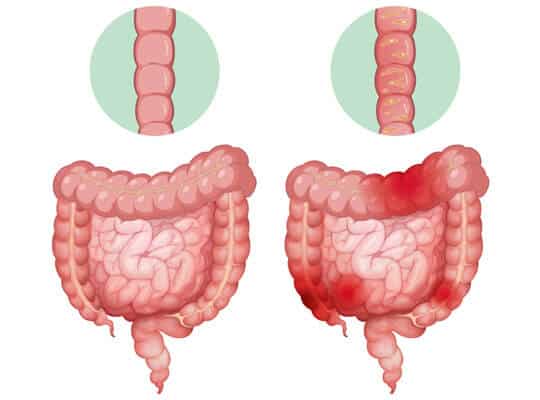Ulcerative Colitis
Table of Contents
Ulcerative Colitis
Ulcerative colitis is a chronic disease that causes inflammation of the large intestine (colon) and rectum. The inflammation can cause sores (ulcers) to form on the inner lining of the colon and rectum, making it painful for you to have a bowel movement. The exact cause of ulcerative colitis is unknown, but diet and stress are known to be associated with flare-ups.
What are the symptoms of ulcerative colitis?
Symptoms may include diarrhea, rectal bleeding, abdominal pain and cramps, fever, weight loss and fatigue. Your doctor will conduct a physical exam including questioning about your symptoms and family history. They’ll also order tests such as a colonoscopy to detect any sores or inflammation in your large intestine
If you experience any symptoms of or have a loved one who experiences any symptoms of ulcerative colitis call your doctor right away.

What is ulcerative colitis?
Ulcerative colitis is a chronic condition that causes inflammation of the large intestine, or colon. It can also affect other parts of your digestive system, including your rectum and small intestine.
In ulcerative colitis, sores form on the inner lining of your colon and rectum (also known as mucosa). The sores cause bleeding and pain as well as diarrhea and fever. These symptoms may come and go over time–or they may be continuous if you have severe symptoms that don’t respond well to treatment with medication or surgery.

Ulcerative colitis is a disease that causes inflammation of the large intestine (colon) and rectum
Ulcerative colitis is a disease that causes inflammation of the large intestine (colon) and rectum. The symptoms include diarrhea, abdominal pain and bleeding from your rectum.
It’s a chronic condition that usually lasts for years but can go into remission for long periods of time or even be cured completely. It’s an autoimmune disease, where your immune system attacks healthy tissue in your body by mistake.
There are two types of ulcerative colitis: limited and extensive.(1) Limited UC affects only one area at a time; extensive UC affects several areas at once.(2) The exact cause isn’t known but it appears to be associated with genetics, environmental factors and/or hormones such as estrogen levels during pregnancy or menstruation.(3)
The inflammation can cause sores (ulcers) to form on the inner lining of the colon and rectum, making it painful for you to have a bowel movement
The inflammation can cause sores (ulcers) to form on the inner lining of the colon and rectum, making it painful for you to have a bowel movement. These sores may be internal or external.
If you have an internal ulcer, your doctor will ask you questions about your symptoms and do a physical exam. You may also need imaging tests like an X-ray, CT scan or MRI scan to see if there’s any bleeding inside your body.
An external ulcer is right at the opening of your anus (bottom). Your doctor will look at it during an exam or ask you questions about your symptoms if he suspects this type of ulceration is present.
The exact cause of ulcerative colitis is unknown, but diet and stress are known to be associated with flare-ups
The exact cause of ulcerative colitis is unknown, but diet and stress are known to be associated with flare-ups. Some people believe that certain foods trigger their UC symptoms and make them worse. However, there’s no scientific evidence that diet causes or worsens ulcerative colitis symptoms in most people who have it–it may just be that the disease is more severe when you eat certain foods.
If you do notice a connection between how your body reacts to certain foods and your symptoms, talk with your doctor about what they recommend changing in your diet so that you can manage your condition better overall (and don’t worry: we’ll help!).
What are the symptoms of ulcerative colitis?
- Diarrhea.
- Rectal bleeding.
- Abdominal pain and cramps.
- Fever.
- Weight loss (in severe cases).
If you have these symptoms, they may be caused by ulcerative colitis or another condition that’s similar but less severe than UC (for example, Crohn’s disease). If you have any of these symptoms for more than two weeks, see your doctor to find out what’s wrong with you–and get treatment as soon as possible!

Symptoms may include diarrhea, rectal bleeding, abdominal pain and cramps, fever, weight loss and fatigue
Ulcerative colitis is an inflammatory bowel disease that causes ulcers (open sores) in the lining of your large intestine (colon). The sores can bleed, making it look like you have bloody diarrhea.
The symptoms of ulcerative colitis may include:
- Diarrhea, which sometimes contains blood or pus — this is the most common symptom of ulcerative colitis. The stool may be greasy and float in the toilet bowl water because fats are not absorbed by your body well enough to be digested properly; this can also result in weight loss due to poor absorption of nutrients from food consumed by those suffering from UC.* Rectal bleeding — which may occur at any time during an attack but usually happens after a bowel movement.* Abdominal pain and cramps — these symptoms are often worse when you’re having a flare-up or need to pass stool.* Fever* Weight loss
Your doctor will conduct a physical exam including questioning about your symptoms and family history. They’ll also order tests such as a colonoscopy to detect any sores or inflammation in your large intestine
Your doctor will conduct a physical exam including questioning about your symptoms and family history. They’ll also order tests such as a colonoscopy to detect any sores or inflammation in your large intestine.
The physical exam is important for diagnosis, because ulcerative colitis can cause the same symptoms as other diseases that affect the digestive system. A family history of colitis may help determine if there is a genetic component to your illness; however, it’s not always clear whether genetics plays a role in causing ulcerative colitis since only about 5% of people with UC have blood relatives who also have the disease.
If you experience any symptoms of or have a loved one who experiences any symptoms of ulcerative colitis call your doctor right away
Ulcerative colitis is a disease that causes inflammation of the large intestine (colon) and rectum. The inflammation can cause sores (ulcers) to form on the inner lining of the colon and rectum, making it painful for you to have a bowel movement. The exact cause of ulcerative colitis is unknown, but diet and stress are known to be associated with flare-ups. If you experience any symptoms of or have a loved one who experiences any symptoms of ulcerative colitis call your doctor right away.
For More Information
Please do not hesitate to contact us for more information on the subject.



